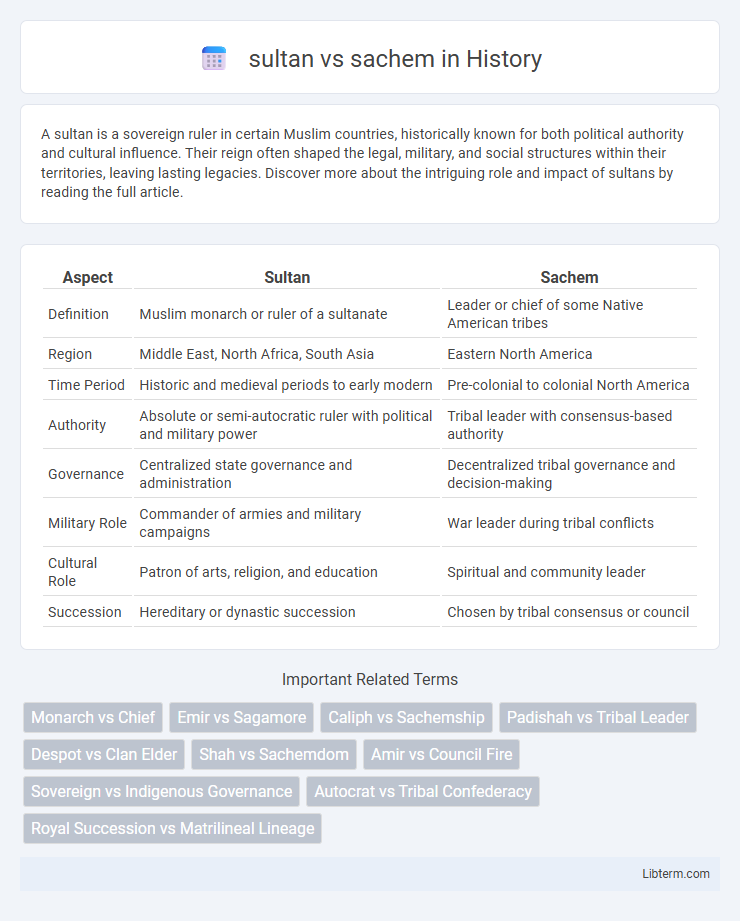A sultan is a sovereign ruler in certain Muslim countries, historically known for both political authority and cultural influence. Their reign often shaped the legal, military, and social structures within their territories, leaving lasting legacies. Discover more about the intriguing role and impact of sultans by reading the full article.
Table of Comparison
| Aspect | Sultan | Sachem |
|---|---|---|
| Definition | Muslim monarch or ruler of a sultanate | Leader or chief of some Native American tribes |
| Region | Middle East, North Africa, South Asia | Eastern North America |
| Time Period | Historic and medieval periods to early modern | Pre-colonial to colonial North America |
| Authority | Absolute or semi-autocratic ruler with political and military power | Tribal leader with consensus-based authority |
| Governance | Centralized state governance and administration | Decentralized tribal governance and decision-making |
| Military Role | Commander of armies and military campaigns | War leader during tribal conflicts |
| Cultural Role | Patron of arts, religion, and education | Spiritual and community leader |
| Succession | Hereditary or dynastic succession | Chosen by tribal consensus or council |
Introduction to Sultan and Sachem
A sultan is a Muslim sovereign ruler historically associated with Ottoman, Persian, and Arab territories, wielding both political and religious authority. A sachem is a Native American tribal chief or leader, particularly among Algonquian-speaking peoples in the northeastern United States, responsible for governance and decision-making within their community. Both titles signify leadership but differ fundamentally in cultural context, governance structures, and the societies they represent.
Historical Origins of Sultan and Sachem
The term "sultan" originated from Arabic, signifying authority and power, historically used by Muslim sovereigns in regions such as the Middle East, North Africa, and South Asia from the medieval period onward. In contrast, "sachem" derives from Algonquian languages, referring to a chief or leader among Indigenous peoples in the Northeastern United States, particularly prominent before and during early European colonization. These titles reflect distinct cultural and political structures shaped by their unique historical contexts and geographic regions.
Geographical Contexts: Where They Ruled
Sultans predominantly ruled vast territories across the Middle East, North Africa, and South Asia, including regions such as the Ottoman Empire, the Sultanate of Delhi, and the Malay Archipelago. Sachems governed smaller, localized areas within Native American tribes, primarily in the northeastern regions of North America, such as the Iroquois Confederacy and other Algonquian-speaking peoples. The scale and cultural contexts of their rule highlight distinct geographical domains shaped by differing social and political structures.
Sociopolitical Structures: Sultanate vs Sachemdom
Sultanates are centralized Islamic states ruled by a sultan who holds both political and religious authority, often supported by a structured bureaucracy and military hierarchy. Sachemdoms, prevalent among Indigenous peoples of the Northeastern Woodlands, operate through decentralized governance where sachems serve as leaders chosen by consensus within the community, emphasizing collective decision-making and kinship ties. This contrast highlights the Sultanate's top-down hierarchical power distribution versus the Sachemdom's more communal and participatory sociopolitical organization.
Roles and Responsibilities: Sultan vs Sachem
The Sultan serves as the absolute monarch, holding supreme authority over political, military, and religious matters within an Islamic state, often responsible for maintaining law, order, and governance. In contrast, the Sachem functions as a tribal chief or leader among Indigenous peoples of North America, primarily overseeing communal decisions, diplomacy, and conflict resolution within the tribe. While the Sultan's role involves centralized power and state administration, the Sachem emphasizes consensus-building and stewardship over tribal welfare.
Cultural Significance and Symbolism
The title "Sultan" holds profound cultural significance in Islamic and Middle Eastern societies, symbolizing sovereign authority, religious leadership, and political power within a hierarchical monarchy. In contrast, the term "Sachem" represents the leadership role of indigenous tribes in North America, embodying values of communal decision-making, spiritual guidance, and stewardship of the land. Both titles reflect deeply rooted cultural identities and governance philosophies unique to their respective regions and historical contexts.
Succession and Leadership Selection
Sultan succession typically follows hereditary principles, often passing leadership from father to eldest son within a royal family, ensuring dynastic continuity and centralized authority. In contrast, sachem leadership selection among Indigenous tribes like the Algonquian peoples involves consensus-building and communal approval, where leaders are chosen based on merit, wisdom, and the ability to maintain social harmony. These differing methods reflect the sultanate's formalized hierarchy versus the sachem's more democratic, council-oriented process.
Influence on Law and Governance
Sultans held absolute power as sovereign rulers in Islamic empires, shaping law through Sharia and centralized governance systems that combined religious and political authority. Sachems, as leaders of Native American tribes, exercised influence through consensus-based governance, guiding community decisions and maintaining social order without codified legal systems. The sultan's authority was institutionalized within imperial frameworks, while the sachem's role emphasized collaborative leadership and customary law.
Interactions with Other Powers
Sultans historically engaged in complex diplomatic and military interactions with European colonial powers, leveraging trade alliances and strategic marriages to maintain sovereignty and influence regional geopolitics. Sachems, as leaders of Indigenous tribes in North America, navigated interactions with European settlers primarily through negotiations, treaties, and sometimes resistance to protect their lands and communities. Both sultans and sachems played crucial roles in mediating power dynamics between their peoples and competing foreign powers during periods of colonization and expansion.
Legacy and Modern Relevance
Sultans historically embodied centralized authority and territorial control, leaving a legacy evident in the cultural and political structures of many Islamic countries today. Sachems, as leaders of Indigenous American tribes, upheld community consensus and stewardship of land, influencing contemporary discussions on governance and environmental ethics. Both titles continue to inform modern leadership models, emphasizing the balance between authority and responsibility within their respective cultural frameworks.
sultan Infographic

 libterm.com
libterm.com